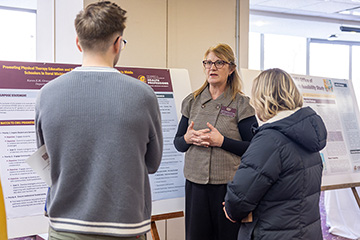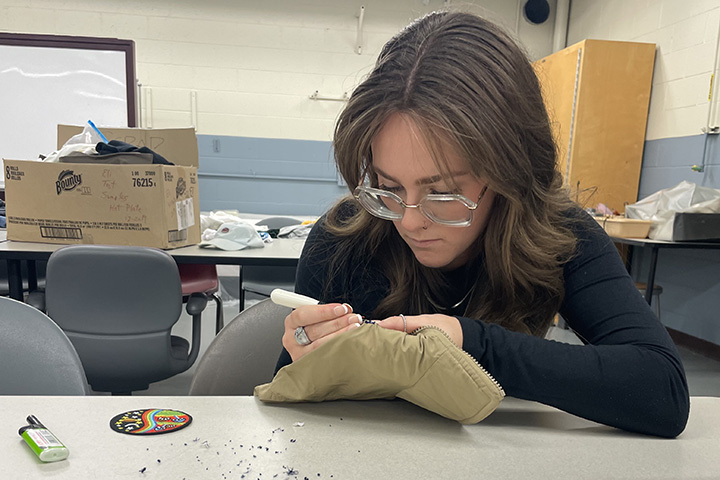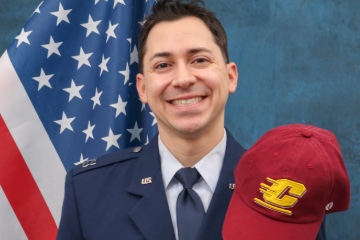CMU’s academic visioning process heads into final stage
Resulting plan offers ambitious priorities, strategies and objectives
In April, Central Michigan University Provost and Executive Vice President Nancy Mathews will take one of the final steps in an academic visioning process that began more than a year ago. She will present the new academic plan, entitled “Elevating the Human Condition,” to the Academic Senate for a final round of feedback.
Mathews said the plan is the result of an intentional and iterative process that led to a bold draft academic vision statement for the future of academics at CMU:
In 10 years, CMU will foster an inclusive and adaptive community of learners who discover their purpose and develop the skills necessary to solve real-world problems and elevate the human condition.
“I'm excited for the future of CMU. This is going to be a bold strategy for the university that will set us apart from others,” Mathews said. “For CMU to continue to thrive in our rapidly changing world, we need to look out on the horizon 10 to 20 years, create our academic vision and then begin to implement the foundational pieces. All across campus, I see an eagerness and will to invest in new ideas.”
An inclusive visioning process
The Higher Learning Commission’s accreditation requires universities to have an academic plan in place, but Mathews said the motivation behind CMU’s academic visioning effort has been much more ambitious than simply reaffirming accreditation. The goal was to determine what CMU needs to be doing now in order to be sustainable and to achieve our mission in 20 years, she said.
The university hosted numerous rounds of listening sessions and provided other opportunities to participate and make suggestions. An academic visioning survey in April of 2023 garnered 1,200 responses from students, parents and supporters, faculty, staff, the Board of Trustees, alumni and community members. From this initial outreach, consulting firm Stratus, Inc. led a Scenario Planning process to analyze survey results and develop a strategic context summary document.
The summary document identified future uncertainties including global change and artificial intelligence, and used those challenges to create scenarios, which guided strategy development. Beginning in May of 2023, three workshops engaged more than 100 faculty, staff, senior leaders, and students and used the summary document as a foundation to develop scenarios, strategies and initial SMART goals.
The use of Scenario Planning in the development of CMU’s academic plan was vital to producing a plan that considers a wide range of possible futures and develops strategies to prepare CMU to thrive, Mathews said. “The resultant scenarios provide a context to develop strategy and for monitoring the external environment in which CMU operates as it strives to build adaptive capacity and proactively shape its future.”
Establishing CMU’s priorities
Through the process, two main elements of the academic plan emerged:
- Developing engaged and adaptive leaders and learners
- Revitalizing the CMU community
Both elements are backed up with specific strategies, objectives and goals developed by the academic visioning workshop groups. Academic Deans and Vice presidents were then tasked with developing additional SMART goals.
“One of the ideas coming out of the scenarios is redefining our curriculum, degrees and programs to focus on global grand challenges. It raises the question of how we might structure programs that focus on themes such as the United Nations Sustainable Development Goals,” Mathews said. “What if a program focused on poverty alleviation, affordable and clean energy, or industry, innovation and infrastructure?”
“We are going to be looking at redefining degrees and redefining the structures on campus, including our colleges, and asking how we can truly embrace interdisciplinary learning,” Mathews said.
Also woven throughout the academic vision and plan are ideas aligned with CMU’s 2023-2028 Strategic Plan, such as an emphasis on preparing students for success through hands-on learning experiences.
“A facet of the vision that I find particularly inspiring is the emphasis on transformative and experiential learning experiences,” Richard Rothaus, dean of the College of Liberal Arts and Social Sciences said. “This process is designed to ensure our programs distinctly outline how degrees in liberal arts and social sciences equip students with the interdisciplinary, adaptable skills that are highly sought after by employers.”
Supporting a new academic era for CMU
Mathews said stakeholder support is vital to achieving the sizeable goals and ambitious change called for in the new academic plan. From students, staff and faculty to the wider university community, she expects the inclusiveness of the entire visioning process will aid its success.
“This is not a top-down, prescribed plan. This vision has come together based on the engagement of many people who bring individual perspectives, knowledge and skills,” she said. “Our faculty, staff and students have been an integral part of the process in building the vision. I hope they will see themselves in it and embrace the opportunity to not only be part of change, but also be leaders of change.”
Next steps for a new vision
After incorporating feedback from April’s presentation to the Academic Senate, Mathews expects to present the final version of the academic vision and plan to the CMU Board of Trustees during their June session.
Then comes the task of implementation, a step for which she believes faculty, staff and students are ready.
“I would be delighted to see people stepping forward to take leadership roles for implementing different pieces of the plan and we will be enabling that starting this fall,” Mathews said.
CMU’s new academic vision and plan will be available for the public to read on the Office of the Provost’s website after they are finalized in June.




